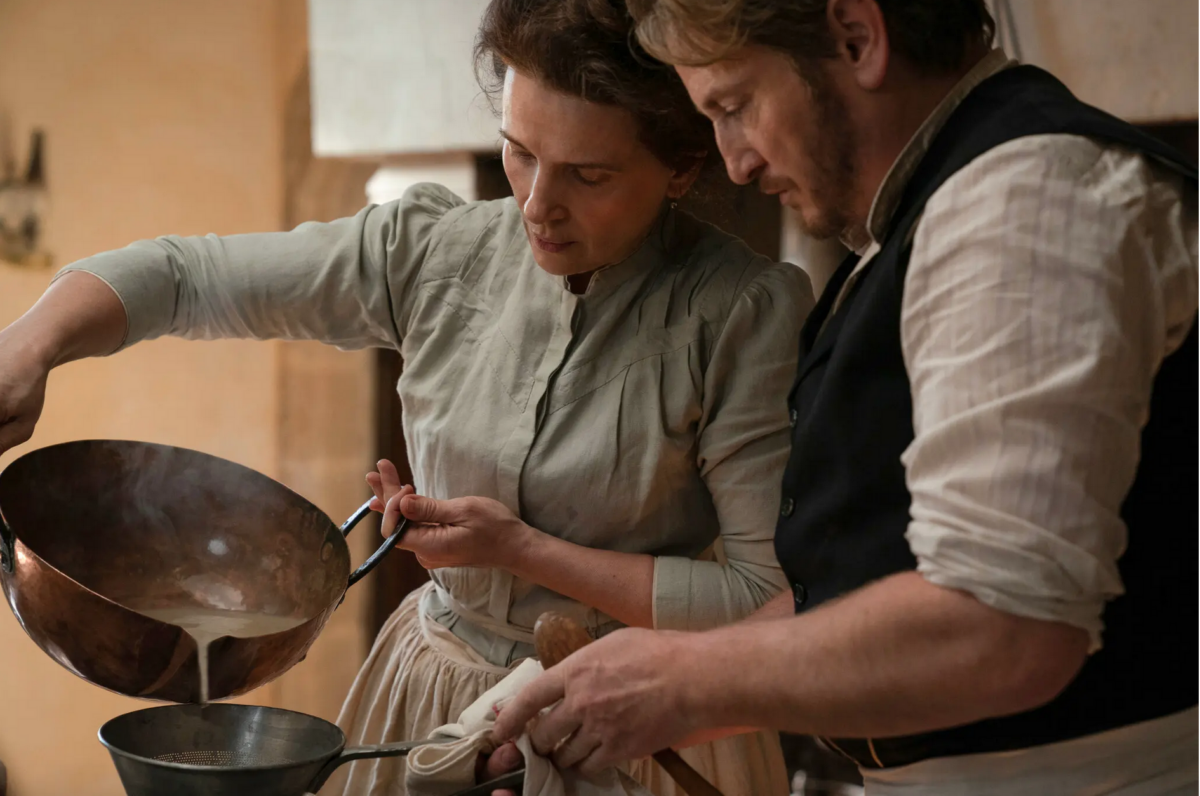
Lately, there has been much talk of “love languages,” the preferred ways that people give and receive love. In Tràn Anh Hùng’s sublime The Taste of Things, the preparation of food is the ultimate love language—an act of service that is also a deeply sensual pleasure that requires dedication and precision while simultaneously reminding us of the bittersweet, ephemeral nature of life.
The film is largely set on a manor in the French countryside, sometime in the late 19th century. Dodin (Benoît Magimel) is the master of the house—and a noted chef and gourmand himself. Eugénie is his cook—and lover. (Add a thief and a wife and we’d have a Peter Greenaway film.) They share an all-consuming passion for food and a love of being in the kitchen. This being the 19th century, everything in that kitchen is sturdy, made of cast iron or wood—the kitchen is filled with wonderful sounds of chopping and simmering and clanging (as well as outdoor birdsong and a persistently meowing cat). Eugénie, in particular, also loves spending time in the garden, pulling up cabbages and radishes and herbs that she will include in the day’s meals.
The film starts with a nearly 40-minute scene of the preparation of one of those meals—and if you don’t like seeing animal flesh being gutted, stuffed, plucked, and tied, you’ve come to the wrong movie. Most of the finished food in the film looks divine—you’ll be craving baked Alaska, roasted veal, skate floating in cream and butter, and whatever that puff pastry masterpiece was—but Tràn gets into the visceral nature of the preparation, too. The kitchen scenes are not for the squeamish.
But to Dodin and Eugénie, these are the tools of their art and how they communicate their love. Yes, they are in love, but not married—her call, not his. She likes the current arrangement. She is happiest when making a meal plan, cooking with and for him, and leaving her door open, sometimes, for him to join her in bed at night. But she values her alone time and, in a strange way, also values the clear lines of employee/employer between them, even if those lines have been blurred over the years.
That meal they’re preparing at the film’s start is for Dodin’s best friends, a group of wealthy men, like him, in their 50s and 60s, who are epicureans. They don’t just eat the food Eugénie has prepared for them, they savor it—first inhaling its smells, then slowly swirling and chewing and swallowing it until they slump back into their chairs with a contented sigh. Wine from Dodin’s cellar is the drink of choice, naturellement, but they also enjoy cognac and a post-meal pipe. Eugénie never joins them, even though they protest. She prefers to be in the kitchen.
The men are kind and joyful and loving. This isn’t a film about the callousness of the rich—quite the contrary. There is a real fellowship among these best friends. They are fiercely loyal to the better things in life—and to each other.
The day of the party, the manor’s young housekeeper brings her even younger cousin, who it turns out is a bit of a prodigy. She has a remarkable palate for someone her age. At one point, Dodin tests her by feeding her a complex sauce and she matter-of-factly rattles off its ingredients. Later, she is so overcome with emotion by the taste of that baked Alaska, she says she might cry. That emotion is not just an ineffable expression of love, but perhaps the sense that the moment of eating it has now come and gone—a Proustian nostalgia for the present. Dodin and Eugénie decide they want to make her their apprentice.
The Taste of Things is not just a sensual experience for the characters, but for the viewer as well. And it goes beyond the food. The pastoral manor is bathed in a golden light that changes with the seasons and humming with activity—it comes alive for us; we feel as though we’ve stepped into a Renoir. And Tràn has an interest in all aspects of the flesh—at one point, he cuts from a perfectly shaped pear to Eugénie in repose on her bed, her naked form mimicking the curves of the fruit.
At 59, Juliette Binoche is as beautiful as ever—and cinephiles will know that she and co-star Magimel fell in love 20 years ago on set and even have a child together. (They broke up several years ago.) It adds a bit of subtext and meta poignancy, if you will, to the film. Dodin and Eugénie have grown old together, and familiar, but that makes their love stronger. At one point, Dodin attends a fussy luncheon thrown by a prince. The food is ridiculously ornate and busy and there’s far too much of it. But Dodin knows better. Like food, the best things in life are slowly nurtured, loved, and perfected over time.
The Taste of Things is now playing at The Charles.
